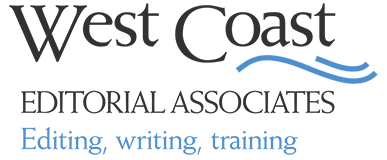There are many editing and plain language conferences planned this year.
Tips on getting started as a freelance editor
 When I was starting out as an editor in the mid-1990s, I clearly remember attending a session with the late Claudette Upton, a founder of West Coast Editorial Associates (WCEA) and a very generous mentor, who is honoured through the Editors Canada Claudette Upton Scholarship. Claudette was presenting on how to get started as a freelance editor, and I hung on her every word. Her advice boiled down to the fact that aspiring editors need to recognize that they are operating a business and must have some basic tools to get started. I can still hear her saying that to be in business as an editor, you need a computer, a business card, and a fax machine (remember: this was the 1990s). Though most of the tools of the trade have changed in three decades, her advice about starting a business and professionalism still resonates.
When I was starting out as an editor in the mid-1990s, I clearly remember attending a session with the late Claudette Upton, a founder of West Coast Editorial Associates (WCEA) and a very generous mentor, who is honoured through the Editors Canada Claudette Upton Scholarship. Claudette was presenting on how to get started as a freelance editor, and I hung on her every word. Her advice boiled down to the fact that aspiring editors need to recognize that they are operating a business and must have some basic tools to get started. I can still hear her saying that to be in business as an editor, you need a computer, a business card, and a fax machine (remember: this was the 1990s). Though most of the tools of the trade have changed in three decades, her advice about starting a business and professionalism still resonates.
Today, I frequently find myself in Claudette’s shoes: being asked for advice on how to get started as a freelance editor. Here’s a summary of some of what I’ve learned over the years.
Get training in editing and publishing
While most editors have at least a bachelor’s degree, this is not a requirement. What is essential to becoming a professional editor is completing courses in the various types of editing, grammar basics, and the publishing process. Many universities and colleges offer professional editing programs, and WCEA partners teach (or have taught) for the SFU Editing Certificate, Douglas College’s Professional Communication (Post-Degree Diploma), and UBC’s Writing and Communication Skills Program. There are many other programs at post-secondary institutions across Canada. Editors Canada has an excellent list of editing programs and courses.
Volunteer to get practical experience and build your portfolio
Once you have some training and a good understanding of the different types of editing and the editor’s role, it’s important to apply what you’ve learned in the real world. If you’re a university student, you may find an internship or co-op position, or an opportunity to volunteer for your university’s student newspaper. If not, one of the best ways to gain experience and start to build a portfolio is to volunteer for a non-profit organization. Many non-profits require an editor for their publications, blog posts, or website. This is an excellent way to get experience and contribute to a cause that you feel strongly about. Charity Village is a website that lists volunteer editor positions as well as paid positions with non-profit organizations.
Join a professional association
All WCEA partners have found value in becoming involved with various professional editing associations, and I think joining an editing-related professional organization is one of the best ways to begin your career as an editor. These organizations offer professional development workshops, conferences, and resources, and they are an excellent way to connect with other editors and learn from some seasoned pros.
Editors Canada is the only Canada-wide association for editors in the country, and it is well worth joining if you are just starting out. It has a mentorship program, offers a wide range of webinars, and has published So you want to be an editor: Information about a career in editing, which provides a lot of helpful information about becoming an editor. Most provinces have branches that hold monthly meetings and offer events, workshops, and webinars for members.
Two American associations that are also great for networking and professional development are ACES: The Society for Editing and the Editorial Freelancers Association. Both offer excellent webinars, resources, and annual conferences.
Another well-respected association is the Chartered Institute of Editing and Proofreading (CIEP). It’s for editors in the UK, but many Canadian editors belong to it and speak highly of its programs and courses.
Create a network by volunteering for a professional association
Building a network is essential; the more contacts you have, the greater the chance that editing job referrals will come your way. The best way to network is to join a professional editors association (see above), but what’s even more valuable is to get involved with the association by volunteering. When I was first starting out as an editor, I joined Editors Canada (then the Freelance Editors’ Association of Canada) and served on the professional development committee and later joined the executive. I made invaluable connections that led to several contracts (not to mention lifelong friends and colleagues). Volunteering is a way to show that you are reliable, professional, and easy to work with. It’s also a chance to develop your skills and work with experienced editors who can give advice and mentor you. Volunteering can often even lead to your first editing contract or job.
Use social media to connect with other editors
Social media can also be a great way to network with other editors, and I suggest that aspiring editors follow experienced editors on Twitter/X or ask to join an editors’ discussion group on LinkedIn or Facebook to learn from other editors and hear about opportunities. For example, the Editors’ Association of Earth is a very large Facebook discussion group of editors from around the globe. It also has many spinoff groups, including Business + Professional Development for Editors. By engaging in these groups, you can keep up to date on the latest trends and opportunities in the editing world and network and learn from other editors’ experiences. When joining any online group, be sure to review the group’s rules and guidelines, and keep in mind that the relevance and activity of these groups can change. Social media is also an excellent way to market your business, and British editor Louise Harnby has a number of resources and webinars on this topic.
Behave like a business
Finally, remember Claudette’s advice: you’re starting a business. You’ll eventually want to build a website, possibly start a blog, create a LinkedIn page, know your editing rates, and learn everything you can about starting up and running a freelance business. You’ll also need to stay on top of trends in language and publishing by taking workshops, reading articles and blog posts about editing, and attending conferences.
Getting started as an editor can seem daunting, but while building a successful career takes time and persistence, I believe that if you complete courses in the editing process, volunteer to build your network and portfolio, and act like a business, you will gradually be able to turn your experiences into a satisfying and rewarding freelance editing career.



